UPDATE 8/8/15: Dominique’s most recent column: I’m Too Old for This
By Pamela Burke/April 23, 2012
TWITTER: @Slowlovelife
All things fascinating, beautiful, and wondrous are discussed on Dominique Browning’s blog Slow Love Life. We follow it religiously here at TWE, wondering what special photos and subject matter Dominique will turn up next.
She is a well-respected writer and was Editor-in-Chief of one of our favorite magazines, House & Garden. Unfortunately, it ceased publication overnight in 2007, and she lost her job.
“The idea of Slow Love is just taking and giving ourselves permission to take a little time every day to feed our soul.” Dominique Browning
Dominique decided to write all about it in a very candid and amusing book called Slow Love: How I Lost My Job Put On My Pajamas and Found Happiness . We couldn’t wait to talk to her about her concept of Slow Love and her new project, Moms Clean Air Force.
Here are is an excerpt from Stacey Gualandi’s radio interview with Dominique along with some inspiring photos from her blog…
STACEY: I know what you’re talking about in your book because I went through a similar situation of losing a job. What exactly do you mean by Slow Love? Does this have anything to do with one’s love life or not at all?
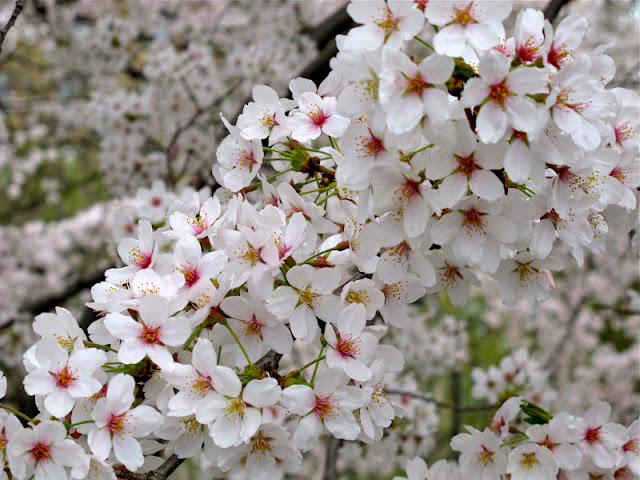
STACEY: Yes! Why don’t we do that already? Is that because a lot of us lead such crazy and busy lives?
DOMINIQUE: I think we fall out of the habit, and we do lead crazy lives. I think about the number of times I’ve glanced out the window and seen that the sunset is beautiful and then gone back to my computer or washing the dishes.
But instead, if you pull up a chair and sit and watch for 15 minutes, it is amazing. You can actually feel your pulse and your heart rate; you feel the stress flying out of you. And you just become so much more connected and so much more full of gratitude for the miracle of this life.
“You can find this in your backyard. We don’t have to overcomplicate it.”
STACEY: You wrote an article about this feeling that we’re constantly pummeled by the internet, and that no one is making any kind of personal connections anymore other than on social media.
DOMINIQUE: Yes! And we’re never with the one we’re with. We’re always with somebody, but we’re tweeting to somebody else, or we’re online, but we’re supposedly having a conversation with somebody else. The idea of Slow Love is just taking and giving ourselves permission to take a little time everyday to feed our soul.
I became very convinced in the course of climbing out of my hole after losing my job that you don’t have to go to an ashram. You don’t have to check into a religious retreat. You can find this in your backyard. We don’t have to overcomplicate it.
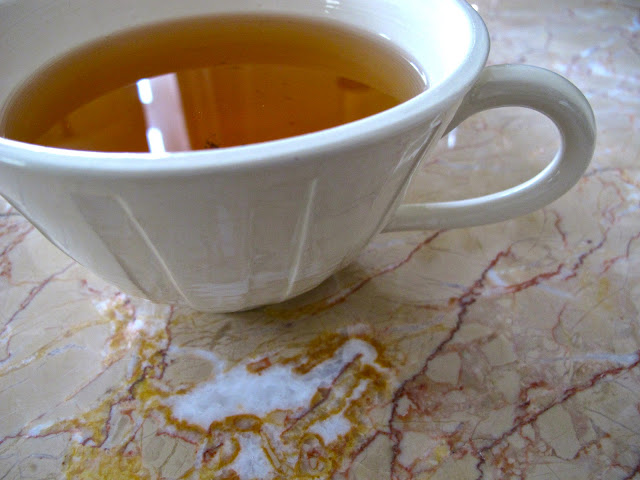
STACEY: Did this epiphany happen because of your big life transition?
DOMINIQUE: It was because of an epiphany that I began to heal myself from being catapulted into what I would call a depression from losing my job and that paralyzing fear that I wouldn’t be able to take care of myself.
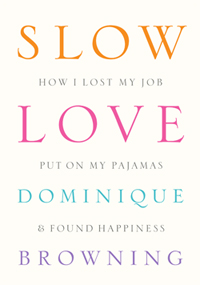 STACEY: It’s because, I think, that we get so identified by what we do for a living.
STACEY: It’s because, I think, that we get so identified by what we do for a living.
DOMINIQUE: That’s exactly right, and that’s one of the wonderful things about working. But even more basic than that, we have to pay our bills. I have to pay my bills. Women tend to not give each other enough credit for that.
A lot of us are supporting ourselves. So let’s acknowledge that and realize that when you lose your job, you go into a panic about your house, your children, your mortgage, all of it. We’re seeing that happen all over the place.
STACEY: You are somebody who really broke the glass ceiling when it came to being a journalist and a writer. You wrote for Newsweek. And then, of course, you were the Editor-in-Chief of House & Garden for many years. So when that all ended, you must have asked yourself why. That’s what I always do; I always ask why.
DOMINIQUE: That’s something we don’t talk enough about. There are all these statistics about unemployment, but we need to remember that there are people and broken hearts behind all of those statistics. Losing your job is a deeply humiliating, terrifying experience. You feel rejected. You feel like a failure. You feel like you’ve fallen out of the human flow.

STACEY: Yes. That happened to me several years ago when the job that I had for ten years all of a sudden was not there. You retreat into this little hole of wearing your pajamas. We laugh about it now, but at the time it was not easy.
DOMINIQUE: No, it wasn’t easy at all, and, of course, I was doing everything you’re supposed to do. I was making the calls. I was meeting with the headhunters. It just so happened that I lost my job as the economy was spiraling down very quickly.
It became clear to me that I was going to have to think of a whole new way to make a living, but I had no idea what that was going to be.
STACEY: So it becomes reinvention time. Was there a process for you to get out of that funk?
DOMINIQUE: I didn’t see it at the time, but when I look back, I could see that there was a process. Part one involved engaging with nature in a deeper way. I started gardening, and I do think that for anybody who’s depressed, physically moving is a very important part of the cure.
Whether you’re walking, swimming, going to a yoga class, or whatever is your fancy, you need to feel like a body in motion with the air on your face. It’s very, very important.
And slowly but surely I began to grope towards this new effort that I’m involved with, Moms Clean Air Force. Julianne Moore (as you can see in the above video) has joined forces with us as have many others. Because of my journey, even though I didn’t know where I was going, I have started in a new place that is a lot of fun for me, and that I really believe in deeply.
STACEY: That’s what I think is so great about the journey. We’re always about control, and here’s this thing that just happened organically for you. And it’s something that you’re very passionate about. Tell us about Moms Clean Air Force.
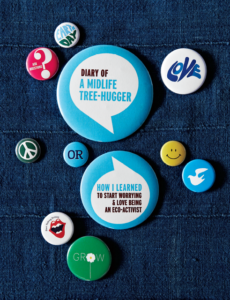 DOMINIQUE: It’s an organization that is fighting air pollution because of children’s health. Our air is much cleaner than it was 40 years ago, but there are a lot of invisible poisons coming out of coal-fired power plants and other places.
DOMINIQUE: It’s an organization that is fighting air pollution because of children’s health. Our air is much cleaner than it was 40 years ago, but there are a lot of invisible poisons coming out of coal-fired power plants and other places.
We need to make our voices heard against the lobbyists. We need to say that we really believe in clean air because it is fetuses, infants and toddlers whose brains are most profoundly affected by air pollution. Their lungs are affected with asthma with all kinds of poisons.
STACEY: So you trying to reach out to environmentalists or are you going in a whole other direction?
DOMINIQUE: We are trying to reach parents who don’t think of themselves as activists or environmentalists. We want to show them why it’s important for them to engage as citizens.
We know that moms and dads really want to buy the right food and clean products and keep chemicals out of their children’s lives. What we’re talking about is something that money cannot buy, that you can only get by strong job-creating regulations.
STACEY: Was there something that happened within your life or with your own kids that prompted this, or was it just something you just started reading about, and it escalated from there?
DOMINIIQUE: A lot of people get involved in these things because their children have terrible asthma or mercury poisoning or things like that. No, my children have not been affected by those conditions that I know of.
“I want to do something to leave the world a better place. I’m thinking about our grandchildren.”
It’s really because the more I read, the angrier I became that we would even have these kinds of poisons spilling into our air. And like a lot of people, I thought the Clean Air Act took care of everything. I thought it was done, and especially because a lot of these things are invisible, and you don’t see them.
So when I started learning what was really going on and about acid rain and mercury in the air and in our water and food, I really thought that this is outrageous.
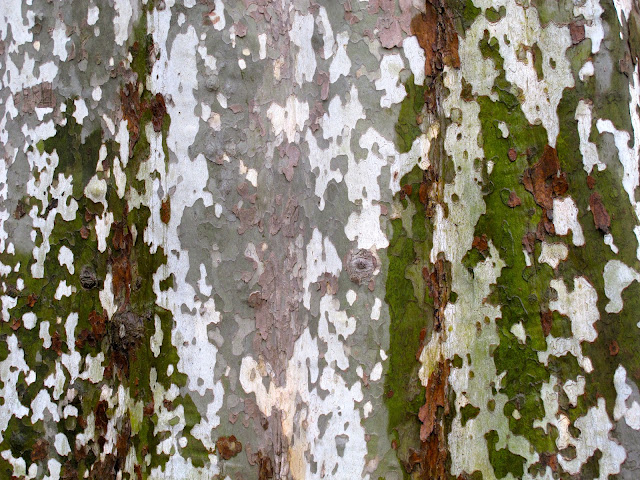
STACEY: Yes, exactly! What have you been able to accomplish with this new website and cause?
DOMINIQUE: We launched Moms Clean Air Force in the middle of August. We have more than 50,000 moms signed up now and are working on the ground in Ohio, Michigan, and New Hampshire with plans to open in other states.
We’re educating people and have articles up all over the internet on different websites. I think people are learning more because we’re talking about this stuff not as scientists but as regular people, real people.
STACEY: Obviously this has to be something that’s very rewarding to you because, again, when House & Garden went away, this was not something you thought was going to be in your future. Right?
DOMINIQUE: No. It wasn’t anything that I had been planning to do or thinking about doing. But I must say I think when we hit our 50s, we start thinking about the world we’re leaving behind. There is a feeling of wanting to make the world a better place. And all the experience and things that we’ve learned in our lives and in our careers up until then can be put to new use.
“I love where I am now…I’m discovering new things about myself.”
STACEY: When you look back at 2007 when you probably felt your world was crashing in and then look where you are now, what do you feel? You have your blog. You’ve got this new organization plus you’re writing about so many other things for so many different publications.
DOMINIQUE: I love where I am now. I feel that it is a very odd world for me not to have an office to go to everyday and see the same people. But now I’ve created my own structure, and I’ve also created a lot of flexibility. I’m discovering new things about myself.
When my designer helped me set up my blog, she said you need a camera, and you need to take pictures. So I have now started taking pictures, and that’s been so much fun.
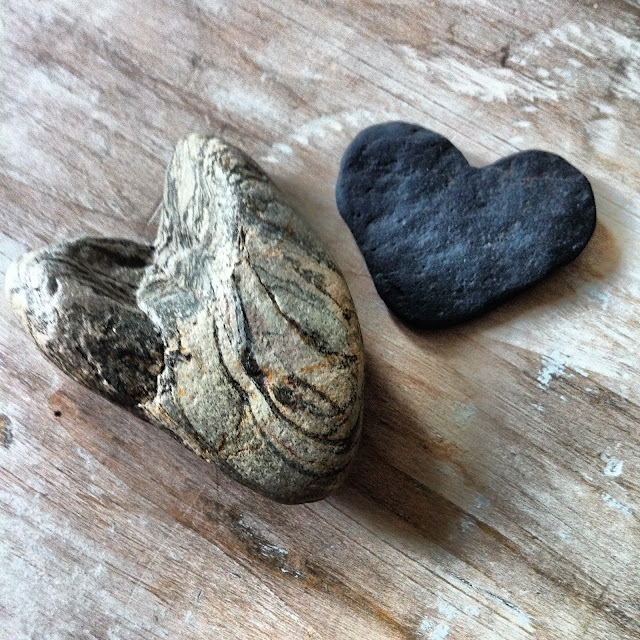
STACEY: Your blog is a great venue for all of the photographs that you have taken. Did you know that you had this talent for taking them and really capturing the things you’re thinking about?
DOMINIQUE: I had no idea. I did it because I had to do it, and then I started loving doing it. I find that it’s just a whole new creative release for me. That’s the sort of thing that can happen when you are thrown off your path, and you’re told that now you have to do something totally new.
“I decided that I was not going to let this defeat me.”
STACEY: Do you think that in some way it’s probably good that we go through upheaval in some way?
DOMINIQUE: I would never wish this on anybody. We have a choice in life whether to make the best of something or whether to let it crush us. I decided I was not going to let this defeat me. I think that eventually you find the strength to make the best of something that could have hurt you.

STACEY: Do you think you’d like to write another book?
DOMINIQUE: I hope so, maybe another Slow Love Life book, and who knows what’s coming around the bend. I’ve given up trying to predict.
STACEY: You’re right!!! I just want to say thank you so much, Dominique, and I’m adopting your attitude so stuff doesn’t bother me anymore. I need to put on my pajamas now.
Lead Photo by Frances Palmer
Photos in this interview by Dominique Browning
###
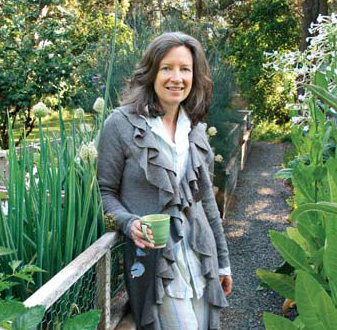



Leave a Reply